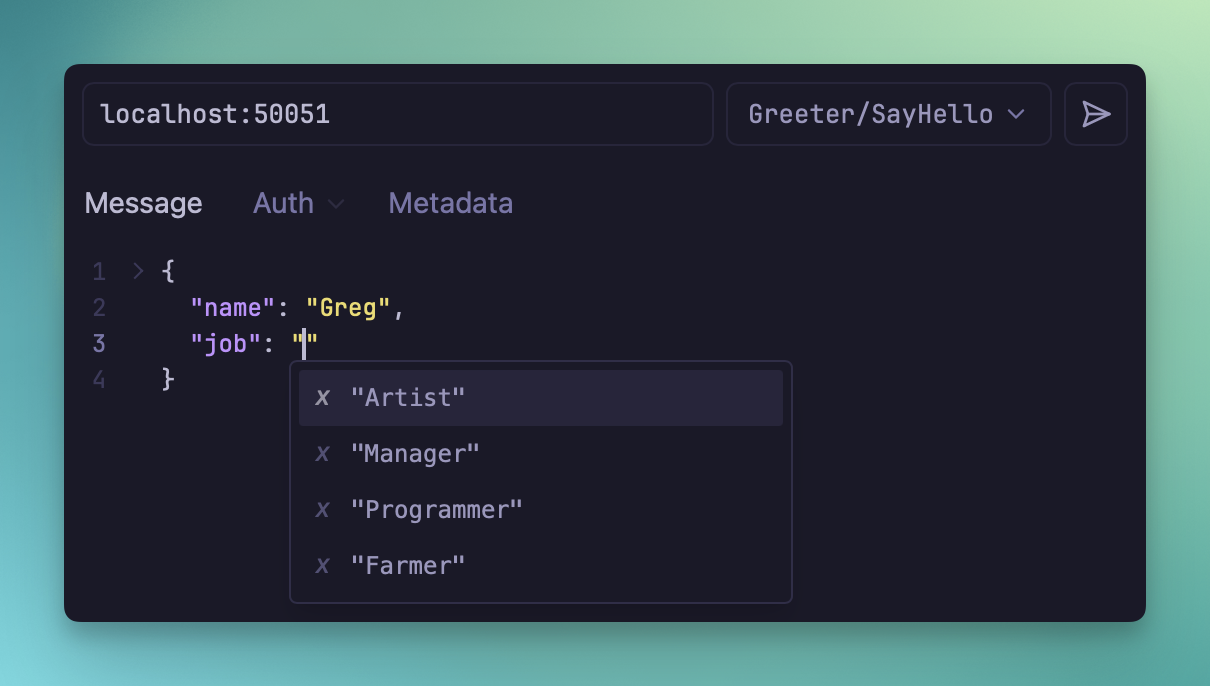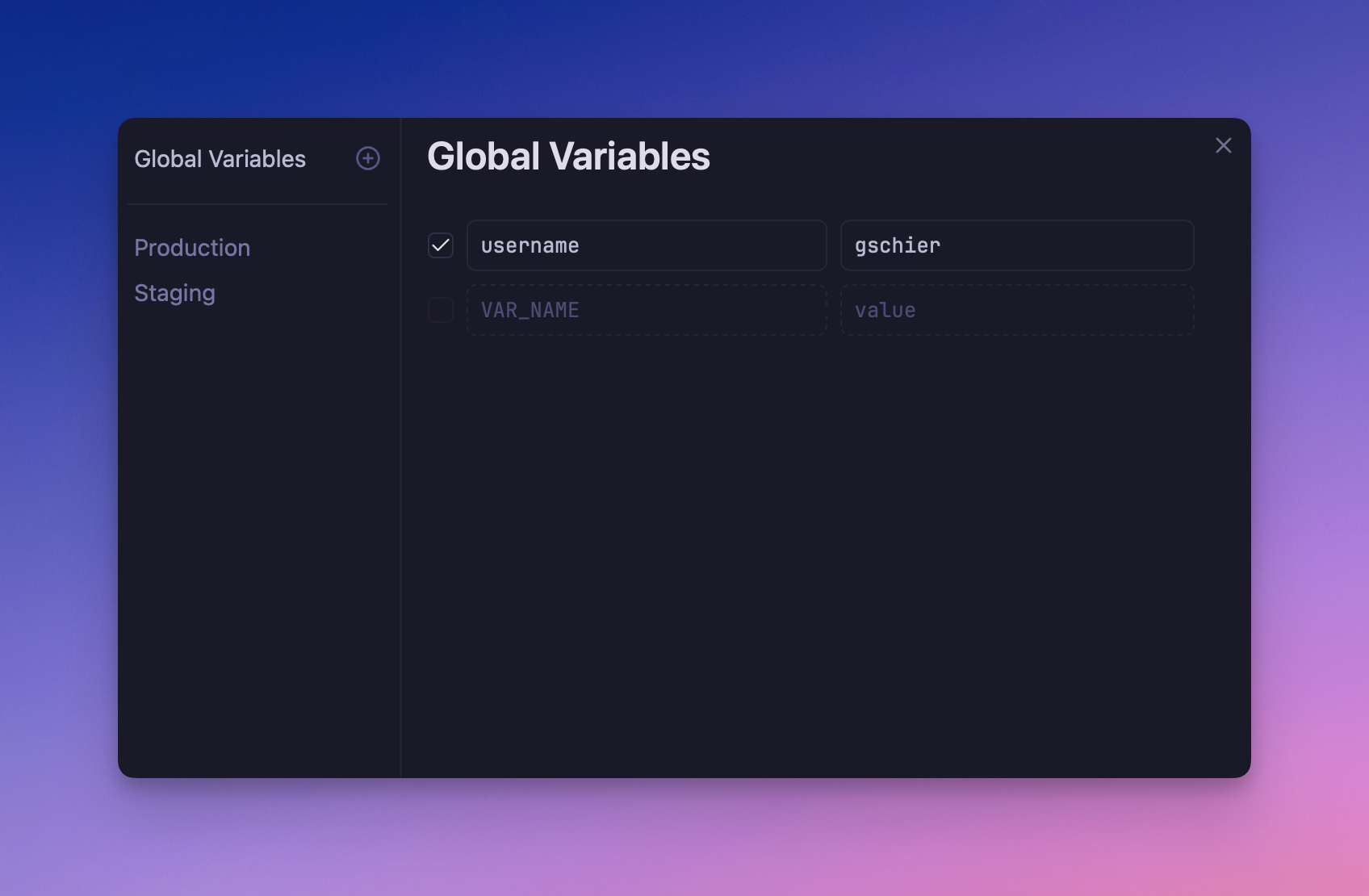gRPC, Globals, and Menu Filter
Great news! Yaak now speaks gRPC, adding yet another tool to the toolkit of REST and GraphQL.
That’s not all you get today though. Be sure to stay ‘till the end of the changelog so you don’t miss the other goodies that came along for the ride.
🚀 gRPC Support
gRPC is a performance-focused RPC framework, mostly used for internal communication in microservice architectures. There’s actually 4 types of gRPC calls, all of which are supported in this release of Yaak.
- Unary → A single request and response, similar to a traditional HTTP request
- Server Streaming → A single client request resulting in a stream of server
messages
- Client Streaming → A stream of client messages resulting in a single server
response
- Bidirectional Streaming → A stream of client messages server messages
intermingled
Protocol Buffers and Reflection
Unlike text-based formats like JSON or XML, gRPC uses binary protocol buffers (protobuf), making it faster to encode and decode, and more compact. The downside is that humans like you and me can’t read or write protobuf messages, making manually debugging difficult. This is where Yaak comes in.

To construct a protobuf message Yaak must know the correct structure. For servers with
reflection enabled,
Yaak will automatically fetch the type descriptions. 🪄 Otherwise, you’ll be prompted to
select the *.proto definitions manually.
Like GraphQL, these definitions provide autocomplete and linting to help construct message bodies. To get around the binary format, messages are defined in JSON, which getsn converted to protobuf behind the scenes. Cool, right? gRPC, as easy as JSON.
Authentication and Metadata
gRPC uses HTTP/2 for transport so, naturally, also supports standard authentication techniques like Basic Auth and Bearer tokens.
Metadata is also supported and is sent via HTTP/2 headers on the initial client request. Yaak will also show the response metadata from the initial server response, as well as the trailers (like headers, but at the end) on connection close.
Missing In This Release
There’s a lot to cover with gRPC, and Yaak doesn’t support everything yet. Two notable missing features are:
- Binary Metadata → A compliment to the text-based metadata Yaak currently
supports
- Client Certificates → Authenticate using TLS client certificates
Be sure to submit some Feedback if you require these and so they can be prioritized.
Fixes and Improvements
It’s been amazing to see all the feedback, bugs, and feature requests coming in! Yaak is clearly striking a chord with many of you, so let’s keep it coming!
Here’s the full list of changes in this release, linked to the original feedback items where applicable.
🌍 Global Environment Variables
Environments are great for defining things like authentication tokens that differ between
development and production. However, sometimes you only need one environment or have
something like user_role that has the same value no matter which environment.
Now you can define variables in a global environment any use them anywhere, independent of which “sub environment” is active. Note that conflicting variables within sub-environments will get priority.

🕵️ Filterable Menus
Inspired by the wonderful JetBrains IDEs, you can start typing in any dropdown menu to
filter. This came about because the CmdOrCtrl+N hotkey now opens the “create” menu
instead of creating a new HTTP request. Simply type a few characters to select between
HTTP, GraphQL, gRPC, or folder, and continue on your way.
Yet another step towards ditching the mouse 🤘🐭
Also don’t worry, HTTP is still the first option so you can simply hit Enter to quickly create a new HTTP request like before.
Features
- gRPC Support
- Ability to cancel requests
- Define global variables
- Format XML responses
- Filterable Dropdowns
Tweaks
- Show request method to sidebar
- Add “other” text body type
- Add Import/Create actions to initial empty state
- CmdOrCtrl+N now opens create dropdown
- More clear highlighting of variables
- Prompt for name on folder creation
Fixes
- Variables now work in Basic Auth fields
- Better handling of invalid URLs
- Cmd+Enter no longer creates new line in body editor
- Drag-n-drop now works on Windows
- Prevent dragging folders into themselves 🤦
- Recent requests menu now resets on close
- Tab works in editor for indentation
- Close dialogs with Esc key
- Better find/replace styles for editor components
- General improvements to hotkey handling